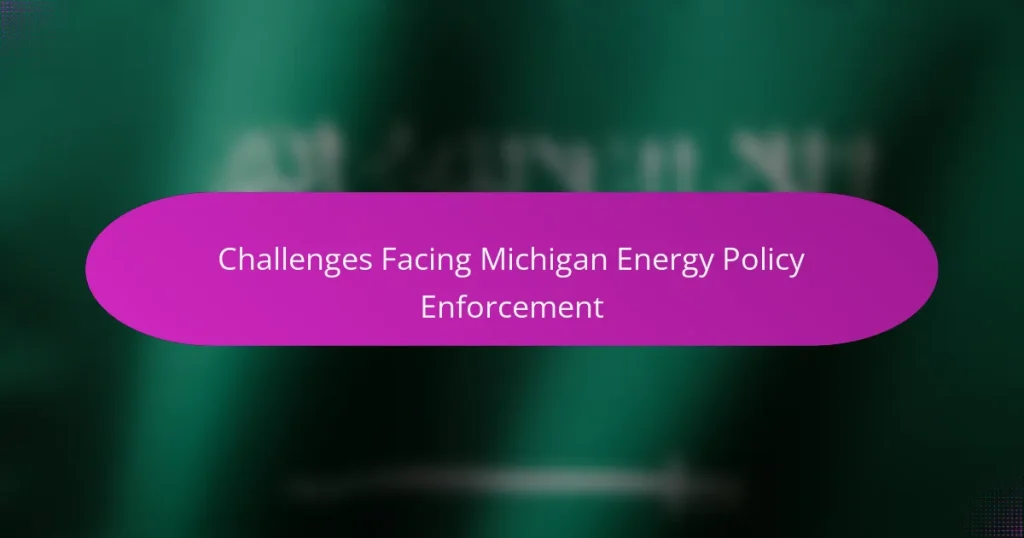
What are the main challenges facing Michigan energy policy enforcement?
The main challenges facing Michigan energy policy enforcement include regulatory inconsistencies, limited funding, and stakeholder opposition. Regulatory inconsistencies arise from overlapping state and federal regulations, making compliance complex. Limited funding restricts the ability to implement and monitor energy policies effectively. Stakeholder opposition often comes from utility companies and interest groups resistant to change. These challenges hinder the state’s ability to meet its energy goals and enforce policies effectively. For instance, a report from the Michigan Public Service Commission highlights that inadequate resources can lead to insufficient oversight of energy programs.
How do regulatory frameworks impact energy policy enforcement in Michigan?
Regulatory frameworks significantly influence energy policy enforcement in Michigan. These frameworks establish the legal and procedural guidelines for implementing energy policies. They define the roles of various stakeholders, including state agencies, utility companies, and consumers. Effective regulatory frameworks ensure compliance with state and federal energy laws. They also facilitate the integration of renewable energy sources into the grid. For example, Michigan’s Public Service Commission oversees utility regulations and ensures adherence to energy standards. Additionally, regulatory frameworks can promote transparency and accountability among energy providers. This leads to improved public trust and participation in energy initiatives. Overall, the strength and clarity of regulatory frameworks are crucial for successful energy policy enforcement in Michigan.
What specific regulations are most challenging to enforce?
Regulations related to energy efficiency standards are among the most challenging to enforce. These regulations often require comprehensive monitoring and reporting from businesses and consumers. Compliance can be difficult due to varying interpretations of the standards. Additionally, there is often a lack of resources for enforcement agencies. For instance, Michigan’s energy efficiency programs face scrutiny regarding their effectiveness. According to the Michigan Public Service Commission, enforcement difficulties arise from insufficient data collection methods. This results in challenges in verifying compliance and measuring actual energy savings. Furthermore, public awareness of these regulations is often low, complicating enforcement efforts.
How do these regulations affect stakeholders in the energy sector?
Regulations in the energy sector significantly impact stakeholders by shaping operational practices and financial outcomes. For instance, compliance costs can increase for energy producers, affecting profit margins. These regulations often require investments in cleaner technologies, which can burden smaller companies disproportionately. Additionally, consumer prices may rise as companies pass on compliance costs. On the other hand, regulations can enhance market stability and encourage innovation in renewable energy. They also aim to protect consumers by ensuring fair pricing and reliable service. Overall, while regulations impose challenges, they also drive long-term benefits for the energy sector.
Why is public awareness important for energy policy enforcement?
Public awareness is crucial for energy policy enforcement because it fosters accountability and compliance. When citizens understand energy policies, they are more likely to support and adhere to them. Increased public knowledge can lead to greater participation in energy conservation efforts. According to a study by the American Council for an Energy-Efficient Economy, informed communities demonstrate higher energy efficiency. Awareness campaigns can also encourage feedback, helping policymakers adjust regulations based on public input. Additionally, public scrutiny can deter violations of energy policies. Ultimately, informed citizens can hold both policymakers and corporations accountable for their energy practices.
How does public perception influence policy compliance?
Public perception significantly influences policy compliance. When the public views a policy as beneficial or necessary, compliance rates increase. Conversely, negative perceptions can lead to resistance and non-compliance. For instance, studies show that public trust in government correlates with higher adherence to environmental regulations. Research indicates that policies perceived as fair and equitable foster greater public support and compliance. In Michigan, community engagement in energy policies can enhance compliance levels. This is evident in initiatives where public education led to increased participation in renewable energy programs.
What strategies can enhance public understanding of energy policies?
Effective communication strategies can enhance public understanding of energy policies. Clear and accessible language should be used in policy documents. Visual aids, such as infographics, can simplify complex information. Community engagement initiatives foster dialogue between policymakers and the public. Educational workshops can provide in-depth knowledge about energy issues. Social media campaigns can reach broader audiences quickly. Research indicates that transparency in policy-making increases public trust. Surveys show that informed citizens are more likely to support energy initiatives.
What role do local governments play in Michigan’s energy policy enforcement?
Local governments in Michigan play a crucial role in enforcing energy policies. They implement state energy regulations at the local level. Local governments also create ordinances that align with state energy goals. They can promote renewable energy initiatives and energy efficiency programs. Additionally, local governments may conduct inspections and enforce compliance with energy standards. Their involvement helps to tailor energy policies to community needs. This localized approach enhances the effectiveness of state energy policies. Local governments also engage with residents to raise awareness about energy conservation.
How do local policies align with state energy regulations?
Local policies align with state energy regulations through compliance and coordination mechanisms. Municipalities often adopt local energy policies that reflect or build upon state mandates. This alignment ensures that local initiatives support state goals for energy efficiency and renewable energy. For example, Michigan’s state energy laws encourage cities to implement energy-saving programs. Additionally, local governments may receive state funding or technical assistance to help meet these regulations. This collaboration fosters a unified approach to energy management across different levels of government. Furthermore, local policies can fill gaps in state regulations, addressing specific community needs. Ultimately, the synergy between local and state policies enhances the effectiveness of energy governance.
What challenges do local governments face in enforcement?
Local governments face several challenges in enforcement. Limited resources hinder their ability to monitor compliance effectively. Insufficient funding affects staffing levels and training opportunities. Complex regulations can lead to confusion about enforcement procedures. Lack of intergovernmental coordination complicates enforcement efforts. Inconsistent public support can create resistance to enforcement actions. Legal constraints may limit local governments’ authority to impose penalties. These factors collectively undermine the effectiveness of local enforcement initiatives.
What are the implications of non-compliance with energy policies?
Non-compliance with energy policies can lead to significant environmental, economic, and social consequences. Environmental implications include increased greenhouse gas emissions and degradation of natural resources. Economically, non-compliance may result in fines, increased operational costs, and loss of funding for energy initiatives. Socially, it can lead to public health issues due to pollution and a decline in community trust in regulatory bodies. Historical data shows that areas with high non-compliance rates often experience worsened air quality and related health problems. For instance, the American Lung Association reported that regions failing to adhere to emissions standards have higher rates of respiratory illnesses.
How does non-compliance affect energy sustainability in Michigan?
Non-compliance negatively impacts energy sustainability in Michigan by hindering the implementation of renewable energy initiatives. When regulations are not followed, it leads to increased reliance on fossil fuels. This reliance contributes to higher greenhouse gas emissions, which undermine sustainability goals. Additionally, non-compliance can result in financial penalties for energy providers. These penalties may discourage investment in cleaner technologies. A lack of adherence to energy policies also disrupts the state’s transition to a more sustainable energy grid. Consequently, Michigan may fall short of its energy efficiency targets. This situation ultimately affects the state’s ability to meet federal energy mandates.
What penalties exist for non-compliance with energy policies?
Penalties for non-compliance with energy policies can include fines, legal action, and revocation of permits. In Michigan, the Public Service Commission enforces compliance. Fines can vary based on the severity of the violation. Legal actions may involve court proceedings to enforce compliance. Revocation of permits can prevent entities from operating until compliance is achieved. Historical data shows that non-compliance can lead to significant financial losses for companies. Enforcement actions aim to ensure adherence to energy regulations and promote sustainable practices.
How can technology improve energy policy enforcement in Michigan?
Technology can enhance energy policy enforcement in Michigan through data analytics and smart grid systems. Data analytics allows for real-time monitoring of energy consumption patterns. This helps identify discrepancies and potential violations of energy policies. Smart grid systems facilitate better communication between energy providers and consumers. They enable automatic reporting of energy use and compliance levels. Additionally, mobile applications can empower consumers to track their energy usage. This increases transparency and encourages adherence to energy policies. Implementing these technologies leads to more efficient enforcement of regulations. The Michigan Public Service Commission has noted that technology can streamline compliance reporting processes.
What technological tools are currently being used for enforcement?
Technological tools currently used for enforcement include advanced metering infrastructure (AMI), remote sensing technology, and data analytics platforms. AMI allows utilities to monitor energy consumption in real-time, enhancing accountability. Remote sensing technologies, such as drones and satellite imagery, provide oversight of energy infrastructure and compliance with regulations. Data analytics platforms process large datasets to identify patterns of non-compliance and optimize enforcement strategies. These tools collectively improve monitoring and enforcement of energy policies in Michigan.
How can data analytics enhance compliance monitoring?
Data analytics can enhance compliance monitoring by providing real-time insights and identifying patterns in data. It allows organizations to track compliance metrics efficiently. Automated data analysis can detect anomalies that may indicate non-compliance. Predictive analytics can forecast potential compliance issues before they arise.
For instance, in energy policy enforcement, data analytics can analyze usage patterns to ensure adherence to regulations. According to a report by the National Renewable Energy Laboratory, data-driven approaches improve compliance rates by up to 30%. This demonstrates the effectiveness of analytics in monitoring and enforcing compliance standards.
What best practices can be implemented to overcome enforcement challenges?
Implementing clear communication strategies is essential to overcome enforcement challenges. Establishing transparent guidelines helps all stakeholders understand their roles. Regular training sessions for enforcement personnel enhance their skills and knowledge. Collaboration with local communities fosters trust and compliance. Utilizing technology for monitoring and reporting can streamline enforcement processes. Data-driven decision-making improves the effectiveness of enforcement actions. Engaging in stakeholder feedback allows for continuous improvement of policies. These best practices create a robust framework for effective enforcement in energy policy.
How can collaboration between stakeholders improve enforcement outcomes?
Collaboration between stakeholders can significantly improve enforcement outcomes by fostering communication and resource sharing. When various stakeholders, such as government agencies, businesses, and community organizations, work together, they can align their goals and strategies. This alignment helps to create a unified approach to enforcement that is more effective.
For instance, joint training programs can enhance the skills of enforcement personnel. Collaborative efforts can also lead to the development of comprehensive monitoring systems that track compliance more accurately. Furthermore, stakeholders can share data and insights, which can inform better decision-making and policy adjustments.
Research shows that collaborative enforcement initiatives can reduce violations by up to 30% in some sectors. This statistic highlights the tangible benefits of stakeholder collaboration in achieving better enforcement outcomes.
What are effective communication strategies for policy enforcement?
Effective communication strategies for policy enforcement include clear messaging, stakeholder engagement, and regular feedback mechanisms. Clear messaging ensures that policies are understood by all parties involved. This involves using simple language and avoiding jargon. Stakeholder engagement builds trust and encourages collaboration. Involving community members and organizations can enhance support for policies. Regular feedback mechanisms allow for the assessment of policy effectiveness. This can include surveys or public forums to gather input. Research shows that effective communication increases compliance rates. A study by the National Institute of Standards and Technology found that clear communication significantly improves adherence to regulations.
The main entity of this article is Michigan energy policy enforcement, which faces significant challenges such as regulatory inconsistencies, limited funding, and stakeholder opposition. Key discussions include the impact of regulatory frameworks on policy implementation, the difficulties in enforcing energy efficiency standards, and the importance of public awareness for compliance. Additionally, the article explores the role of local governments, the implications of non-compliance, and how technology and collaboration can enhance enforcement outcomes. The analysis highlights best practices and communication strategies to improve the effectiveness of energy policy enforcement in Michigan.


